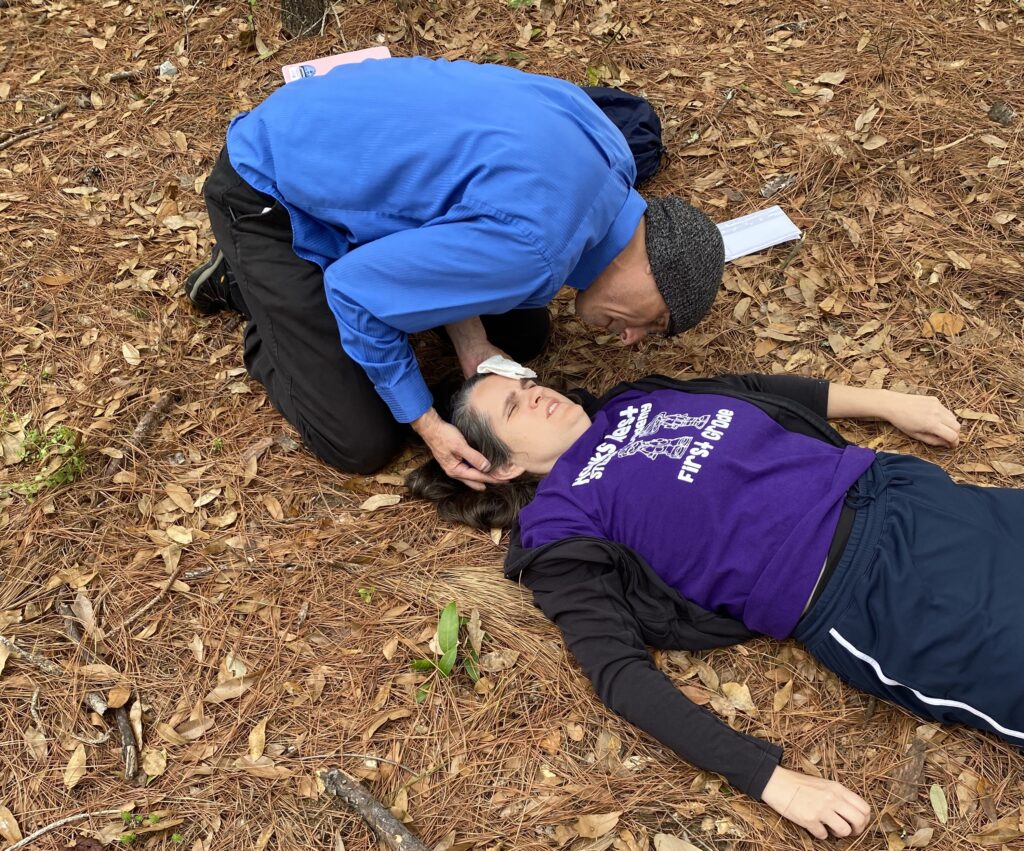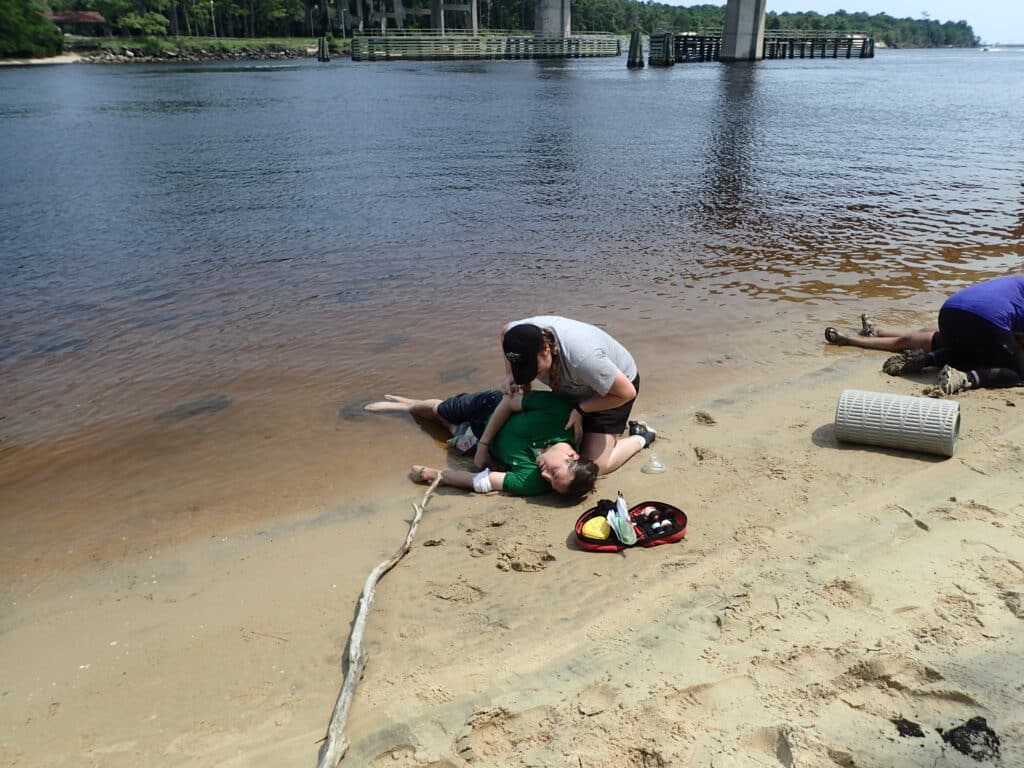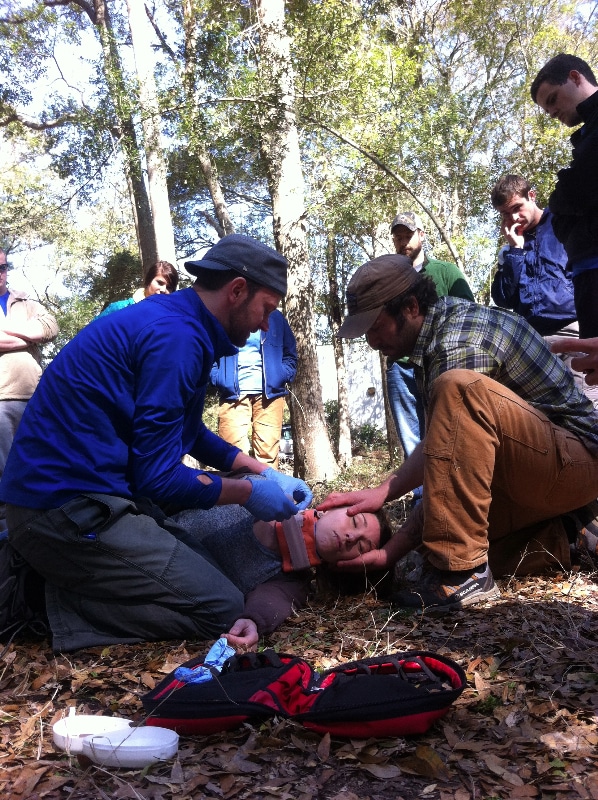Heat Illness: Symptoms, Prevention, and Treatment
Medical TrainingNobody likes to be hot and sweaty on the trail. But when things turn from being uncomfortable to becoming downright dangerous, it’s time for quick, on-the-spot emergency action.
Heat illness is a range of medical conditions that result from the body’s inability to cope with an elevated heat load. When that occurs, it is more commonly referred to as “heat strain.” And whether you’re inactive in a warm, humid environment or participating in strenuous physical activity in the fall or winter, you are at an increased risk of heat illness.

For people who engage in backcountry adventures, heat illness and heat strain are among the many potential health and safety risks. That’s why our instructors at The National Center for Outdoor Adventure Education (NCOAE) include it in our Wilderness Medicine courses. In this post, we bring you up to speed on the basics, including the symptoms to watch for, preventive measures, and treatments to cool an overheated body.
From Bad to Worse on the Heat Illness Spectrum
Heat illness, heat strain, and related injuries occur when the core body temperature becomes elevated, stressing or surpassing the body’s ability to cool itself. Like a nuclear power plant, the human body can suffer serious and potentially fatal damage when its core becomes overheated.
The severity of the condition is on a spectrum generally divided into the following three levels: (more…)
Concussion Recognition and Treatment in the Backcountry
Wilderness Medicine TrainingConcussion recognition and treatment has gotten a lot of attention over the last decade, mostly in the context of youth and professional sports such as tackle football and soccer. It’s even a topic for those who serve in our armed forces. However, confusion over its prevention, diagnosis, and treatment remains widespread.
In an interview with a reporter from the Chicago Sun Times, former National Football League quarterback Brett Favre, who was knocked out cold only once in his 20-year career, claimed that “probably 90 percent” of the tackles he endured left him with a concussion.
He’s most likely correct in that estimation. After all, the definition of “concussion” is broad: “A concussion is a brain injury, a disturbance in brain function induced by traumatic forces, either from a direct blow to the head or a transmitted force from a blow to the body.” It disrupts brain function at the cellular metabolic level but does not result in major structural damage. Conventional MRI or CT scanning will not show evidence of a concussion.

So, how do you know if you or someone else has suffered a concussion while in the backcountry? And, after having made that determination, what should be done? Having clear answers to these two questions is essential for successful recovery and to prevent long-term cognitive and psychological complications. This is true no matter where the concussion takes place, but especially in the backcountry where medical treatment from a full-time team is unavailable. (more…)
The Role of the Wilderness First Responder During Water Rescues
Wilderness Medicine TrainingIt may surprise you to learn that drownings — along with heart attacks and falls — are among the leading causes of death for those who venture into the wilderness for recreation or education in the United States.
Statistics show that there are nearly 4,000 fatal drownings each year in the United States, with a little more than 8,000 nonfatal drownings. These figures include boating-related drownings. In fact, the threat of drowning is so prevalent that the first edition of the NCOAE Wilderness Medicine Field Guide devotes an entire section to Environmental Submersion and Drowning Injury.

Of course, it’s during the spring and summer that most outdoor explorers are on the water, including those participating in backcountry expeditions. Lakes, rivers and streams provide much-needed relief in the backcountry on a hot August afternoon and are sought-after destinations for many outdoor enthusiasts.
For those training to become Wilderness First Responders (WFR) and those participating in Wilderness First Aid (WFA) training, a major consideration is assisting with medical emergencies that occur on or near the water. (more…)
Wilderness Medicine Training in North Carolina
Wilderness Medicine Training Working in remote settings has its challenges. From the lack of a quality connection to the Internet and having to find alternate ways to ‘go to the bathroom,’ to not being able to find a doctor precisely when you may need one, working remotely takes on all new meaning when you’re outdoor educator or backcountry wilderness guide. And while there’s nothing we can do for you here at the National Center for Outdoor & Adventure Education (NCOAE) about the Internet connectivity issue, we sure as heck can train and prepare you or your staff for medical emergencies that happen five or 500 miles away from the nearest hospital.
Working in remote settings has its challenges. From the lack of a quality connection to the Internet and having to find alternate ways to ‘go to the bathroom,’ to not being able to find a doctor precisely when you may need one, working remotely takes on all new meaning when you’re outdoor educator or backcountry wilderness guide. And while there’s nothing we can do for you here at the National Center for Outdoor & Adventure Education (NCOAE) about the Internet connectivity issue, we sure as heck can train and prepare you or your staff for medical emergencies that happen five or 500 miles away from the nearest hospital.
If you take a moment to really think about it, the practice of wilderness medicine has been around a lot longer than anyone really knows. We venture to say that its existence predates 1,800 BC, when the Code of Hammurabi first set out fees for surgeons and punishments for malpractice. Since the very first opportunity to provide lifesaving care in a remote setting, wilderness medicine has been a thing.
Of course, no one on the battlefields of Elam’s Invasion into Mesopotamia ever yelled for a ‘wilderness’ medic. Regardless, “the advancement of wilderness medicine has been closely connected to military exploration/operations throughout history, and not surprisingly, this remains in many ways as true today as it was a thousand years ago,” wrote George W. Rodway in a paper titled The Foundations of Wilderness Medicine: Some Historical Features.
Fast forward to 2015, and NCOAE — through its affiliation with the Wilderness Medicine Training Center — has emerged as a leading provider of wilderness medicine training in North Carolina (and as a custom training provider, anywhere in the world). More to the point, we’re the only provider to offer a Hybrid Wilderness First Responder (WFR) training and a Hybrid Wilderness First Aid (WFA) training, all under one roof. What’s this ‘hybrid’ thing we’re referring to? Good question. Read on, grasshopper.
For people interested in receiving training and certification in the administration of wilderness medicine but can’t get away from home or work for weeks at a time to participate in such trainings, hybrid training allows you to (more…)
TALK TO US
Have any further questions about our courses, what you’ll learn, or what else to expect? Contact us, we’re here to help!